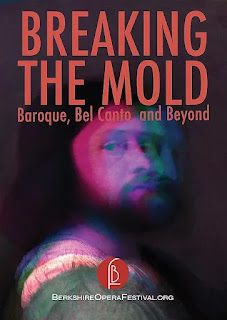Mahaiwe, Great Barrington, MA
July 22, 2023 at 2:00pm
It's true that not everyone loves opera. It's true that not everyone even likes opera. I don't
possess the inclination or the power to change people's minds, but maybe I can nudge those who already appreciate classical music and/or theatre to give opera an honest try.
possess the inclination or the power to change people's minds, but maybe I can nudge those who already appreciate classical music and/or theatre to give opera an honest try.
One of my missions in the arts over the course of several decades, has been to encourage listening and watching opera on PBS, videos, and live on stages.
The best way to begin "the study of opera" is through local opera companies. Attending the Met in NYC is the epitome of opera presentation in this country. However, the Met offers a jump into the deep end. Start off small, listening to exemplary skills of local talent. In the case of the Pioneer Valley, this means Berkshire Opera Festival.
In the Spotlight (ITS) recently had the opportunity to interview Tyson Traynor (TT), Marketing and Communications Manager of Berkshire Opera Festival (BOF) about this season of music.
ITS: The first program in the 2023 season will showcase arias from numerous operas rather than a full-length opera. Is this one of the best ways to indoctrinate newcomers to opera?
TT: Absolutely. This concert is actually perfect for new listeners. We have titled the concert "Breaking the Mold: Baroque, Bel Canto, and Beyond". BOF will feature a smattering of arias and ensemble music by well-renowned composers like Puccini and Verdi, as well as Handel and Mozart and more.
ITS: Will the music be accessible to those who aren't familiar with opera?
TT: It is BOF's mission to explore the entire operatic repertoire, and this concert epitomizes that. There are centuries separating the oldest and most recent arias which will be heard.
Berkshire Opera Festival welcomes Megan Moore back following her resounding success in last season's role as Donna Elvira in Berkshire Opera Festival's production of "Don Giovanni" last season.
ITS: Tell the readers about BOF's highlight of the summer, "La Boheme".
TT: We are excited that "La Boheme," probably the most well-known opera of all time, will be fully staged performances.
ITS: Who are the members of the orchestra? Are the singers from the Berkshires?
TT: We try to make sure that our orchestra and chorus are filled with as many local/regional artists as possible. For our fully staged production of "La Bohème" this season Benoit/Alcindoro will be played by bass-baritone James Demler who is local.
However, other principal cast members come from all over the country, and that's because BOF gets the best artists as well as the best audiences.
ITS: What would you say the future holds for BOF?
TT: The mission of Berkshire Opera Festival is to explore the entire operatic repertoire. BOF is proud to continue to present a world-class slate of artists to perform this powerful music.











